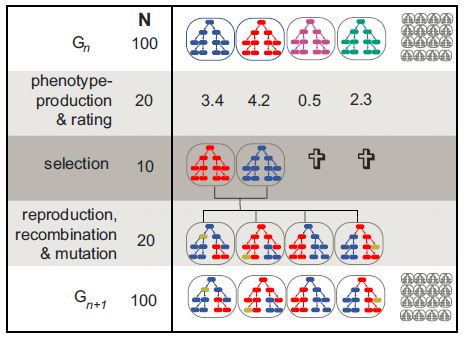Computer program ‘evolves’ music from noise
June 19, 2012 | Source: Science Now

Evolutionary processes in DarwinTunes. Songs are represented as tree-like structures of code. Each generation starts with 100 songs; however, for clarity, it only follows one-fifth of them. Twenty songs are randomly presented to listeners for rating, and the remaining 80 survive until the next generation; thus, at any time, the population contains songs of varying age. Of the 20 rated songs, the 10 best reproduce and the 10 worst die. Reproductives are paired and produce four progeny to replace themselves and the dead in the next generation. The daughters’ genomes are formed from their parents’ genomes, subject to recombination and mutation. (Credit: Robert M. MacCallum Matthias Mauch, Austin Burt, Armand M. Leroi/Proceedings of the National Academy of Sciences)
Bioinformaticist Robert MacCallum of Imperial College London and colleagues have adapted DarwinTunes — a program that produces 8-second sequences of randomly generated sounds, or loops, from a database of digital “genes” — to be accessed online.
Almost 7000 participants rated each sound loop, played in a random order, on a 5-point scale from “can’t stand it” to “love it.”
In a musical take on survival of the fittest, the highest-scored loops went on to pair up with others and replicate. Each resulting generation was rated again for its appeal. After about 2500 generations of sound loops, what started out as a cacophony of noise had evolved into pleasant strains of music.
MacCallum and colleagues hope future incarnations will enable up to a million users to log on and participate. “Having so many users will help the music evolve a lot faster, and then, who knows?” says MacCallum.
Readers can cast their votes at the DarwinTunes Web site.
Ref.: Robert M. MacCallum Matthias Mauch, Austin Burt, Armand M. Leroi, Evolution of music by public choice, Proceedings of the National Academy of Sciences, 2012, DOI: 10.1073/pnas.1203182109 (open access)
See also: Triumph of the Cyborg Composer